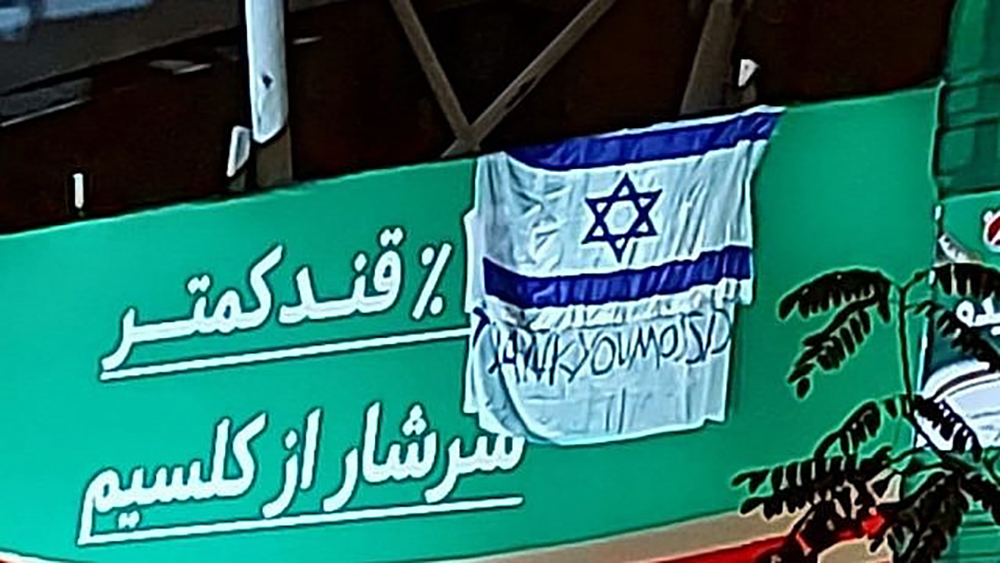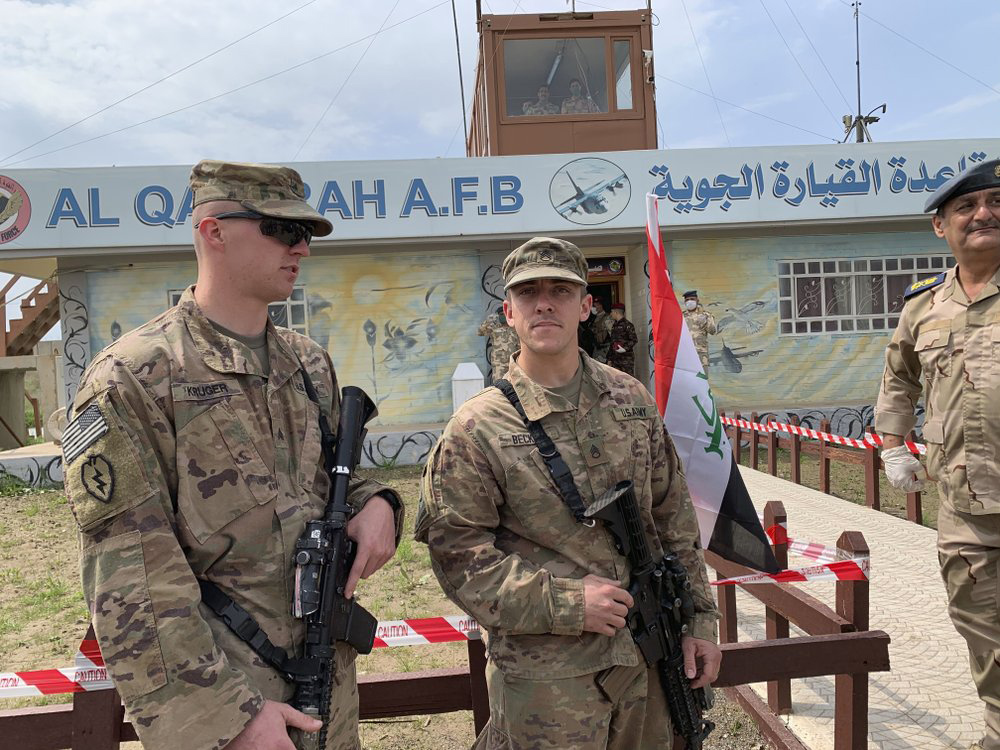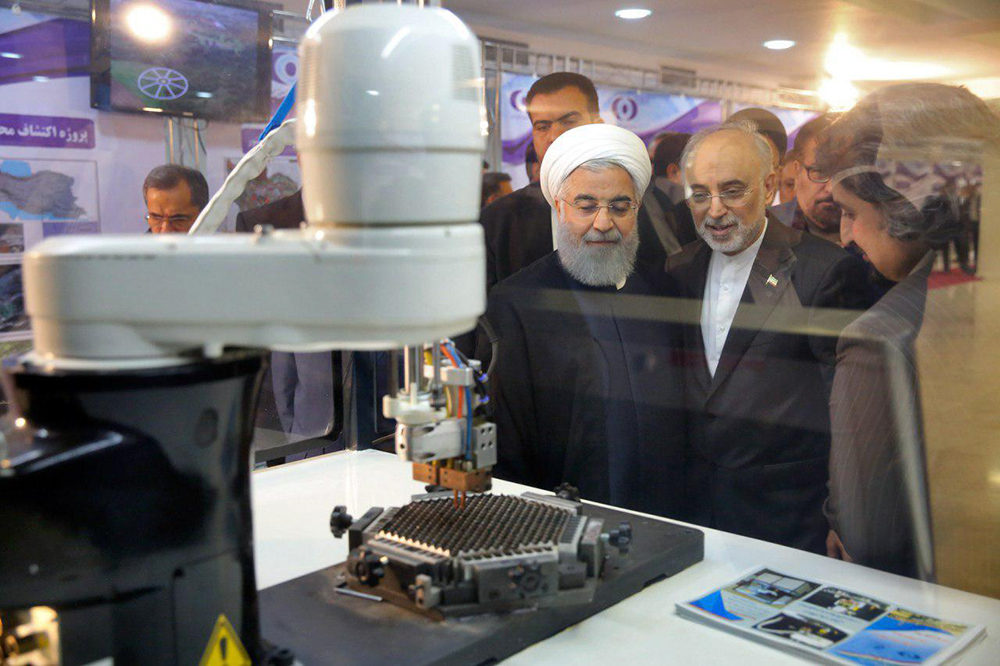Edited by: Fern Sidman
As the Pentagon pulls troops out of the Middle East in the coming weeks, under orders from President Donald Trump, U.S. military leaders are working to find other ways to deter potential attacks by Iran and its proxies, and to counter arguments that America is abandoning the region, according to an AP report on Tuesday.
A senior U.S. military official with knowledge of the region said Monday that Iran may try to take advantage of America’s troop withdrawals from Iraq and Afghanistan, and the planned departure of the aircraft carrier USS Nimitz from the Persian Gulf.
AP reported that the official said as a result military leaders have determined that based on the security situation in the region, the Nimitz must remain there now and “for some time to come.” The official also said an additional fighter jet squadron may also be sent to the region, if needed.
The potential Iranian threat has become an increasing concern in recent weeks following the killing of Iranian nuclear scientist Mohsen Fakhrizadeh, as was reported by the AP.
Because of heightening concerns surrounding Iran’s intentions of bolstering their nuclear arsenal in preparation for a possible attack on Israel, (which has long been considered an extension of the United States in the Middle East by Iran), other countries in the region have been offering their views on the growing threat of a nuclear armed Iran.
According to a December 5th report in the Times of Israel, President-elect Joe Biden has signaled he will return the United States to a nuclear accord with Iran and that he still backs the 2015 deal negotiated under Barack Obama, from which Donald Trump withdrew.
TOI reported that Biden has indicated he will bring Iran’s US-allied Arab neighbors, such as Saudi Arabia, which sees Iran as its arch-rival, into the process.

Speaking to AFP, Saudi Arabian top diplomat, Foreign Minister Prince Faisal bin Farhan said that the Gulf states must be consulted if the US should decide to re-enter the Obama initiated Iran nuclear deal. “Primarily what we expect is that we are fully consulted, that we and our other regional friends are fully consulted in what goes on vis a vis the negotiations with Iran,” he said.
“The only way towards reaching an agreement that is sustainable is through such consultation,” he said on the sidelines of a security conference in Bahrain’s Manama.
“I think we’ve seen as a result of the after-effects of the JCPOA that not involving the regional countries results in a build up of mistrust and neglect of the issues of real concern and of real effect on regional security.”
Asked whether the Biden administration was already in touch about the shape of a revived Iran deal, Prince Faisal said there were no contacts as yet, but that “we are ready to engage with the Biden administration once they take office.”
“We are confident that both an incoming Biden administration, but also our other partners, including the Europeans, have fully signed on to the need to have all the regional parties involved in a resolution,” he said.
TOI reported that Biden told The New York Times this week that if Iran returned to compliance, the US would rejoin the 2015 Joint Comprehensive Plan of Action (JCPOA) after which he would seek to tighten Iran’s nuclear constraints and address concerns about both its missile program and Iran’s support for militants in the region.
According to the Times report, Biden and his team are working on the premise that if the deal is restored on both sides there will need to be new negotiations on the length of time for restrictions on the production of the fissile material necessary for producing a bomb, originally set at 15 years under the JCPOA, as was reported by the TOI.
Biden also hinted that he was prepared to include the Gulf states and Saudi Arabia in addition to the US’ traditional European allies in any renegotiation of the terms of the JCPOA. Others close to the presidential transition team are literally “chomping at the bit” to jump back into the Iran nuclear deal such as Vermont Senator Bernie Sanders (I) and his far-left allies in congress who want to see the US lift sanctions on Iran.
AP reported that a military official said the U.S. is aware of Iranian attack planning and threats, and that some are more mature, while others are aspirational. A key worry, he said, is that Iranian-backed militias in Iraq may be willing to act even without the blessings or direction of Tehran.
Marine Gen. Frank McKenzie, top U.S. commander for the Middle East, has long argued for a consistent aircraft carrier presence in the Gulf region to deter Iran, according to the AP report.
Visiting the aircraft carrier USS Harry S. Truman in the North Arabian Sea in February, McKenzie told the sailors: “You’re here because we don’t want a war with Iran and nothing makes a potential adversary think twice about war than the presence of an aircraft carrier and the strike group that comes with it.”
AP reported that despite widespread demands for U.S. Navy ships in other parts of the world, McKenzie requested and received a much larger than usual naval presence in the Middle East region throughout the early part of this year. But over time, the numbers have declined, in recognition of the Pentagon’s effort to put more emphasis on China and the Indo-Pacific.

Meanwhile, it was reported that Iranian Foreign Minister Mohammad Javad Zarif said that the regime he represents would refuse to renegotiate elements of the international accord limiting its nuclear program. Iran has long insisted that its uranium enrichment program is intended for domestic energy purposes, despite the fact that official nuclear inspectors have discovered otherwise.
Zarif also said Iran won’t agree to any curbs on its missile program or backing of regional proxies unless Western countries stop their “malign behavior” in the Middle East, as was reported by TOI.
In November it was reported that Saudi Arabia’s former ambassador to Washington, Prince Turki bin Faisal Al Saud said in an address to the National Council on US-Arab Relations that “while we all aspire to have Iran back as a normal peaceful nation-state within the international community, the last forty years’ experience with the Iranian regime is not encouraging. He also cautioned Biden against repeating past “mistakes.”
Re-entering the 2015 Iran nuclear deal, as Biden has said he wishes to do, “would not do service to stability in our region. Rejoining and then negotiating the other important issues would trap diplomacy and subject it to Iranian blackmail,” the envoy added, according to the TOI report.
Last month, Israeli Prime Minister Benjamin Netanyahu reportedly held a secret rendezvous with Saudi Crown Prince Mohammed bin Salman in the Saudi Red Sea city of Neom, alongside Secretary of State Mike Pompeo. TOI reported that it was the first known visit to Saudi Arabia by an Israeli leader, but the talks on Iran and possible normalization reportedly yielded no substantial progress.
On that note, Bin Farhan said: “We have as we have always been… completely open to full normalize relations with Israel. We think Israel will take its place in the region, but in order for that to happen and for that to be sustainable, we do need the Palestinians to get their state and we do need to settle that situation.” He said it was “critically important” to encourage the resumption of Israeli-Palestinian peace talks, as was reported by TOI.
Israel is more concerned with the threat of a nuclear Iran than F-35 fighter jet sales to the United Arab Emirates, said Israeli ambassador to the U.S. Ron Dermer on MSNBC’s “Morning Joe” news show Monday, as was reported by World Israel News.
“We believe that the UAE is an ally in confronting Iran, and we do not believe that this arms package will violate the U.S. commitment to maintain Israel’s qualitative military edge,” said Dermer, adding that he was “very comfortable” with the UAE obtaining the jets, according to the WIN report.
WIN reported that in September, reports emerged that the UAE-Israel normalization deal included a clause which gave the U.S. permission to sell advanced F-35 fighter jets, apparently reducing the Jewish state’s qualitative military edge in the region.
Netanyahu previously called the reports “fake news.” Senior Emirati officials told Israel Hayom that Netanyahu gave explicit approval for the arrangement.
“What keeps me up at night is actually not the proposed F-35 sale to the Emirates,” said Dermer. “What keeps me up at night is the idea that somebody would return to the nuclear deal with Iran. I would hope that the incoming administration would understand that 2020 is not 2015.”
WIN reported that Dermer explained that he believed all countries in the region should be consulted before any potential return to the nuclear deal.
“When you’re preparing to do something with North Korea, you know what? You speak to Japan and you speak to South Korea — your allies in that region,” he said, according to the WIN report.
“We hope what the new administration would do is to speak to your allies in the region, speak to Israel, speak to the Arab states. Try to forge a common policy with us because we are on the front lines, and we are in danger from an aggressive Iran.”
Israel Hayom reported that in what can only be considered a remarkable sight, a banner thanking the Israeli spy agency Mossad—with an Israeli flag draped over it—was seen on a pedestrian bridge over a busy thoroughfare in the Iranian capital of Tehran on Monday.
A photograph and video of the banner and flag were uploaded to social media, according to Israel Hayom. The sign was written in English and said, simply: “Thank you, Mossad.”
The message was apparently in reference to the November 27th assassination of Fakhrizadeh in the city of Absard, east of Tehran.
Iranian authorities have accused Israel of being behind Fakhrizadeh’s death, despite the fact that no concrete evidence or verifiable proof of culpability has been offered. Senior officials in the Islamic Revolutionary Guard Corps have threatened military retaliation.
(Sources: AP, Times of Israel, World Israel News, Israel Hayom)




